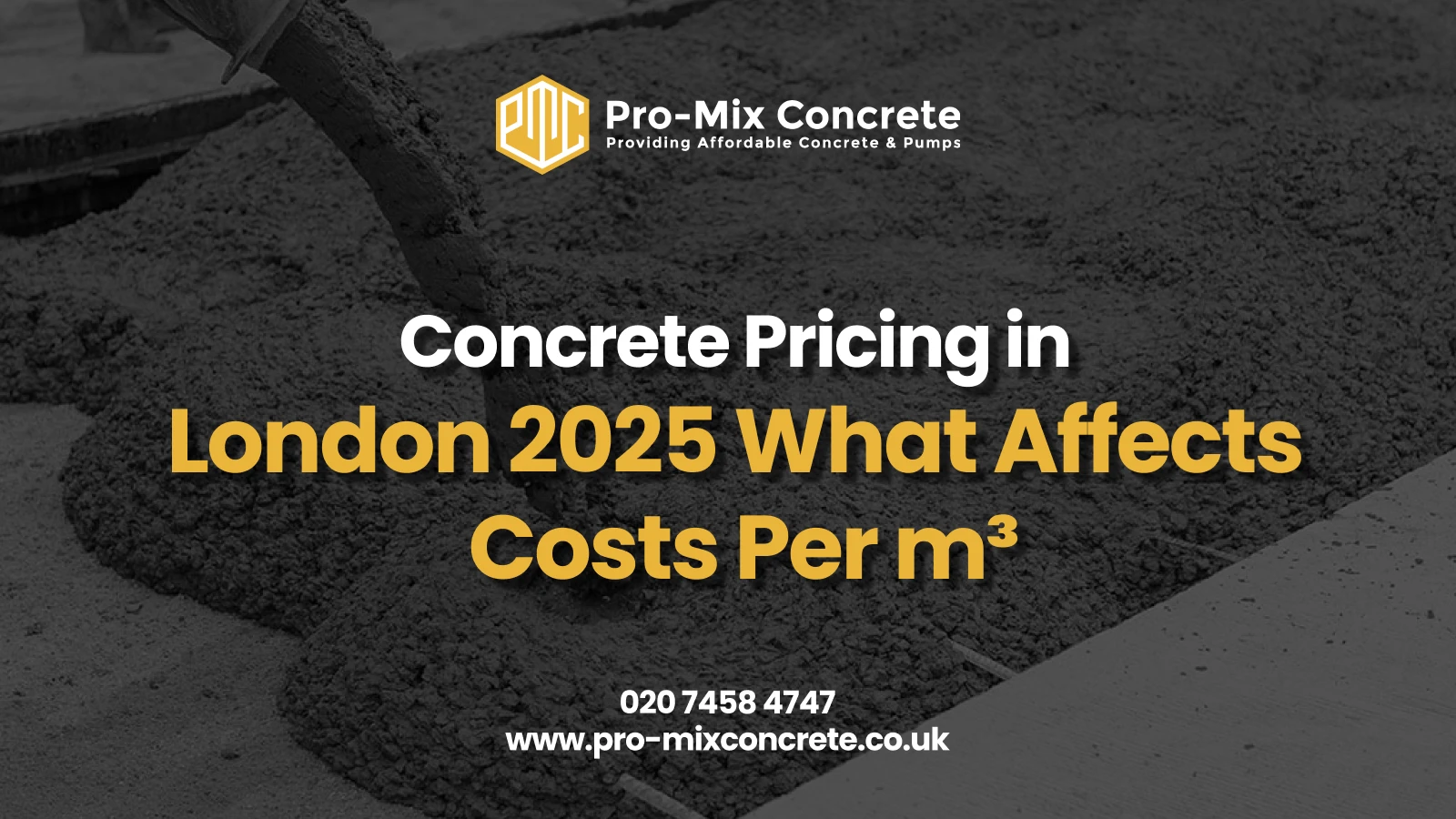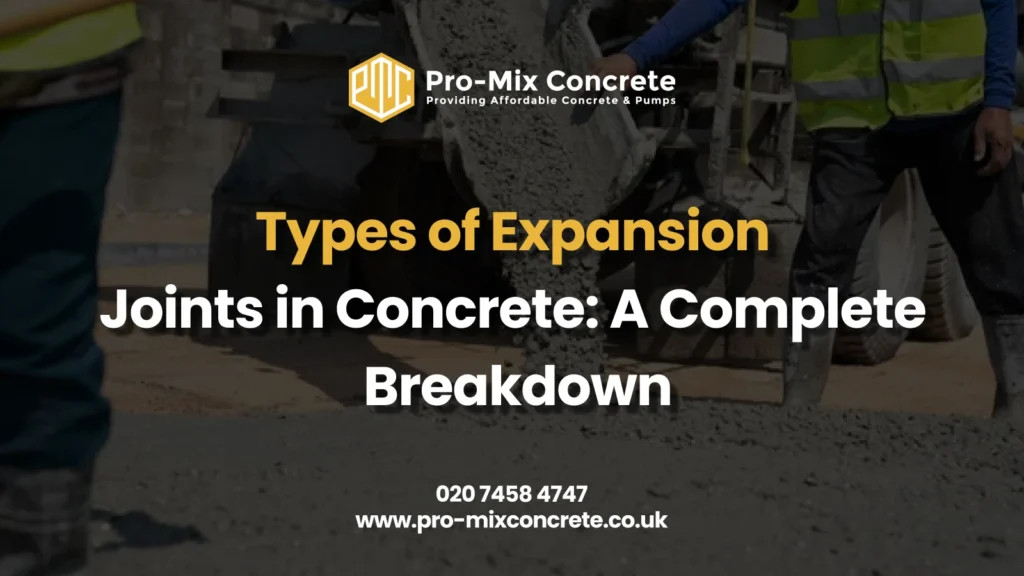London’s concrete market in 2025 presents complex pricing dynamics influenced by material specifications, project volume, delivery logistics, and market conditions. This comprehensive guide breaks down current pricing ranges (£100-£150 per m³), examines key cost factors, and provides practical strategies for managing concrete costs. Construction professionals and homeowners will learn how to navigate pricing variations and make informed decisions for their projects.”
Concrete pricing in London remains a critical factor for successful construction projects in 2025. With construction costs rising across the capital, understanding concrete pricing per cubic metre helps contractors and homeowners budget accurately and avoid costly surprises.
Multiple factors influence concrete costs, from material specifications and delivery logistics to market conditions and labour rates. Smart project planning requires knowing these variables and how they impact your bottom line.
Need competitive concrete pricing for your London project?
Get an instant quote from our experts at Pro-Mix Concrete and see why smart builders choose us for reliable pricing and quality service!
Get in Touch: 0800 772 3808
Current Concrete Pricing in London 2025
Concrete pricing currently ranges from £100 to £150 per cubic metre, depending on grade and specifications. Standard ready-mix concrete typically costs less than specialised high-strength mixes or those requiring custom admixtures.
The UK construction output is forecasted to grow by 3.5% in 2025 and 4.6% in 2026, driving sustained demand for concrete across London’s residential and commercial projects. This growth outlook supports stable pricing despite current market volatility.
Average Cost Ranges by Concrete Grade
Different concrete grades command different prices based on strength requirements:
- C20 Concrete: £100-£115 per m³ – suitable for foundations, footings, and non-structural applications where moderate strength suffices.
- C25 Concrete: £110-£125 per m³ – commonly used for driveways, patios, and light structural work requiring enhanced durability.
- C30 Concrete: £120-£135 per m³ – preferred for structural elements, including beams, columns, and suspended slabs in residential construction.
- C40 Concrete: £135-£150 per m³ – high-strength concrete for commercial buildings, heavy-duty industrial floors, and structures requiring superior load-bearing capacity.
Price Variations Across London
Location within London significantly affects pricing due to delivery distances and local market conditions. Central London projects typically pay premium rates due to access challenges and higher operational costs, while outer London areas often benefit from more competitive pricing.
Ready-mix concrete generally costs 10-20% more than site-mixed concrete but offers better quality control and faster installation. Site mixing requires additional labour and equipment but provides flexibility for smaller projects or remote locations.
Industry Insight: UK concrete manufacturing demonstrates robust performance, with output increasing by 5.9% in February 2025 compared to February 2024. This strong production growth ensures adequate supply capacity to meet the expanding construction demands without major availability constraints.
5 Key Factors Affecting Concrete Costs Per m³
Multiple variables influence final concrete pricing beyond basic material costs. Understanding these factors helps predict total project expenses and identify cost optimisation opportunities.
1. Concrete Material Specifications
Concrete grade directly impacts pricing, with higher-strength mixes commanding premium rates. Moving from C25 to C40 concrete typically increases costs by 15-25% due to higher cement content and specialised aggregates.
Specialist admixtures add significant cost but provide essential performance benefits. Waterproofing admixtures increase costs by £10-£20 per m³, while accelerators and retarders add £5-£15 per m³, depending on dosage requirements.
Custom mix designs cost more than standard formulations. Specialised requirements for colour, texture, or performance characteristics can increase pricing by 20-40% above standard rates.
2. Volume and Project Size
Bulk orders reduce unit costs significantly, with suppliers offering substantial discounts for large volumes!
A concrete calculator ensures precise volume calculations, helping you avoid over-ordering and keeping overall project costs under control.
Orders exceeding 50m³ typically receive 10-15% discounts, while projects requiring 200m³ or more can negotiate even better rates.
Minimum order quantities affect small projects disproportionately. Most suppliers require minimum orders of 6-8m³, meaning small pours face higher per-cubic-metre costs due to delivery and setup expenses.
3. Delivery and Logistics
Delivery distance within London affects pricing through fuel costs and driver time. Projects beyond 20 miles from the batching plant typically incur additional charges of £2-£5 per m³.
Site access challenges increase costs substantially. Narrow streets, height restrictions, or difficult terrain may require specialised vehicles or concrete pumping equipment, adding £15-£30 per m³ to total costs.
Concrete pumping becomes necessary for:
- Upper-floor pours in multi-story buildings
- Locations inaccessible to mixer trucks
- Long-distance placement from road access
- Precision placement requirements
4. Labour and Preparation Costs
London labour rates significantly impact total concrete costs. Skilled concrete workers command £200-£300 per day, with specialised finishing work requiring higher rates.
Site preparation requirements vary dramatically between projects. Proper formwork, reinforcement placement, and surface preparation can add £20-£50 per m³ to total project costs, depending on complexity.
London concrete projects fail when hidden costs appear at the worst moment. Get transparent, all-inclusive pricing from our team. No surprises, no excuses, just honest quotes you can trust.
5. Reinforcement and Additional Materials
Reinforcement type and quantity significantly affect overall concrete pricing. For example, steel mesh adds £8-£15 per m³, while rebar reinforcement increases costs by £15-£30 per m³, depending on density and grade. Fibre reinforcement options include:
- Steel fibers: £20-£40 per m³ additional cost
- Polypropylene fibers: £5-£15 per m³ additional cost
- Glass fibers: £10-£25 per m³ additional cost
- Synthetic macrofibers: £15-£35 per m³ additional cost
What’s Driving Concrete Prices in London Right Now?
London concrete pricing in 2025 is a result of economic pressures and supply chain realities. Knowing about these market forces will help you predict future costs and plan project budgets more effectively.
Material Cost Inflation
Inflation significantly impacts concrete pricing through raw material cost increases. For example,
- Cement prices rose 12-15% in 2024
- Aggregate costs increased 8-10%
This directly affected final concrete prices across all grades and specifications.
Steel reinforcement creates the biggest pricing headaches for contractors. Global market fluctuations cause prices to vary 20-30% annually, making long-term budgeting incredibly challenging for projects requiring significant reinforcement.
Energy costs for concrete production and transport add another pricing layer. Fuel price increases translate directly to higher delivery charges, especially affecting projects in outer London areas where transport distances are greater.
The Labour Shortage Reality
London’s construction labour shortage drives concrete costs higher through wage inflation. Concrete workers command premium rates due to high demand and limited availability, with skilled finishers and pump operators becoming particularly scarce.
Key labour market pressures include:
- Experienced concrete crews are earning 15-20% more than in previous years
- Competition between contractors for qualified personnel
- Premium rates for weekend and overtime work
- Training costs are passed on to customers
Supply Chain Challenges
Brexit continues to affect material availability and pricing through ongoing supply chain disruptions. Import delays and currency fluctuations create pricing uncertainty, particularly for specialised admixtures and equipment sourced from European suppliers.
The Market Reality Behind the Numbers
While concrete demand continues growing in London, the broader UK market tells a different story. Ready-mix concrete sales across the UK hit a shocking 60-year low in Q1 2025, with volumes dropping to about 3 million cubic metres per quarter.
This dramatic decline reflects harsh economic realities affecting the construction industry. Local councils particularly struggle with budget constraints, leading to project cancellations and postponements that ripple through the supply chain.
Cost Breakdown Examples
Residential Foundation Example
A typical London residential foundation requiring 25m³ of C25 concrete includes:
- Material costs: £2,750 (25m³ × £110 per m³)
- Delivery charges: £150 (standard London delivery)
- Labour costs: £1,500 (formwork, placement, finishing)
- Reinforcement: £375 (steel mesh reinforcement)
Total project cost: £4,775 (£191 per m³ including all components)
Concrete Driveway Case Study
A 40m² driveway requiring 6m³ of C25 concrete demonstrates small-project pricing:
- Material costs: £720 (6m³ × £120 per m³ – small order premium)
- Minimum delivery charge: £120
- Site preparation: £300 (excavation and base preparation)
- Labour and finishing: £480 T
- Total project cost: £1,620 (£270 per m³ all-inclusive)
Remember that small projects face higher per-cubic-metre costs due to fixed delivery charges and minimum order requirements.
Tips to Manage and Reduce Concrete Costs
Effective cost management requires understanding when to save and when to spend on concrete specifications. These proven strategies help London contractors and homeowners optimise their concrete budgets without compromising quality.
Choose the Right Grade for Your Needs
Selecting appropriate concrete grades prevents over-specification and unnecessary costs. C20 concrete suffices for many foundation and non-structural applications where contractors might unnecessarily specify C25 or C30, saving £10-£20 per m³.
Match concrete strength to actual requirements rather than defaulting to higher grades. Driveways and patios rarely need more than C25 concrete, while structural elements require careful calculation to determine optimal specifications.
Optimise Delivery and Logistics
Planning efficient delivery reduces logistics costs significantly. Coordinate multiple pours when possible, ensure clear site access, and have labour teams ready to minimise truck waiting time and delivery fees.
Key logistics optimisation strategies include:
- Scheduling deliveries during off-peak hours for better rates
- Ensuring 24-hour site access to avoid restricted delivery windows
- Preparing proper vehicle access routes to eliminate pumping needs
- Coordinating reinforcement placement before concrete arrival
Consider Alternative Reinforcement Options
Fibre-reinforced concrete alternatives eliminate traditional reinforcement needs in many applications. While initial material costs increase by £15-£35 per m³, labour savings and improved performance often provide overall cost benefits.
Synthetic fibres offer particular value for residential projects, replacing steel mesh reinforcement while providing superior crack control and faster installation times.
Bulk Ordering and Supplier Relationships
Volume purchasing delivers substantial savings through economies of scale. Successful bulk ordering strategies include:
- Coordinate with neighbouring projects to achieve minimum volume thresholds and shared delivery costs.
- Schedule multiple project phases simultaneously to maximise order sizes and negotiate better unit pricing.
- Negotiate annual supply agreements with preferred suppliers for consistent pricing and priority scheduling.
- Obtain multiple competitive quotes from different suppliers, comparing total project costs rather than just material prices.
Site Preparation Excellence
Proper site preparation reduces placement time and associated labour costs. Well-organised sites with ready access, positioned reinforcement, and prepared formwork minimise concrete truck standby charges and crew overtime.
Bottom Line
Concrete pricing in London in 2025 shows us complex interactions between material specifications, project requirements, logistics challenges, and market conditions. Successful cost management requires balancing material specifications with project requirements, optimising delivery logistics, and working with experienced suppliers.
Every London builder knows concrete suppliers who overpromise and underdeliver. Pro-Mix Concrete operates differently. We show up when we say we will, with exactly what you ordered, at the price we quoted.
We’ve spent years perfecting concrete delivery in London’s impossible streets and tight deadlines because we understand that your reputation depends on ours. When other suppliers leave you hanging, Pro-Mix delivers results.
Time to work with concrete professionals who mean what they say. Call us at 020 7458 4747 to discuss your project!
Frequently Asked Questions
Average concrete pricing in London ranges from £100-£150 per m³, depending on grade and specifications. C25 concrete typically costs £110-£125 per m³, while high-strength C40 concrete costs £135-£150 per m³.
Admixtures increase costs by £5-£20 per m³, depending on type and dosage. Waterproofing admixtures add £10-£20 per m³, while accelerators and retarders typically add £5-£15 per m³.
Ready-mix concrete costs 10-20% more than site mixing but offers superior quality control, faster placement, and reduced labour requirements. Total project costs often favour ready-mix concrete.
Difficult site access increases costs through specialised equipment needs and extended delivery time. Narrow streets, height restrictions, or distance from roads may require concrete pumping, adding £15-£30 per m³.
- Dennis Broderick
- Dennis Broderick is the founder and owner of Pro-Mix Concrete Company, a trusted name in ready-mix concrete solutions across the UK. With over 20 years of hands-on experience in the construction and concrete industry, Dennis brings unmatched expertise, practical insights, and a commitment to quality on every project - from residential driveways to large-scale commercial developments.
 BlogFebruary 24, 2026What Is C35 Concrete Used For? Applications & Uses Explained
BlogFebruary 24, 2026What Is C35 Concrete Used For? Applications & Uses Explained BlogFebruary 24, 2026Types of Expansion Joints in Concrete: A Complete Breakdown
BlogFebruary 24, 2026Types of Expansion Joints in Concrete: A Complete Breakdown BlogFebruary 23, 2026What Is C25 Concrete Used For? Uses & Applications
BlogFebruary 23, 2026What Is C25 Concrete Used For? Uses & Applications BlogFebruary 22, 2026Cost Of Ready Mix Concrete Per M3 In Uk
BlogFebruary 22, 2026Cost Of Ready Mix Concrete Per M3 In Uk





